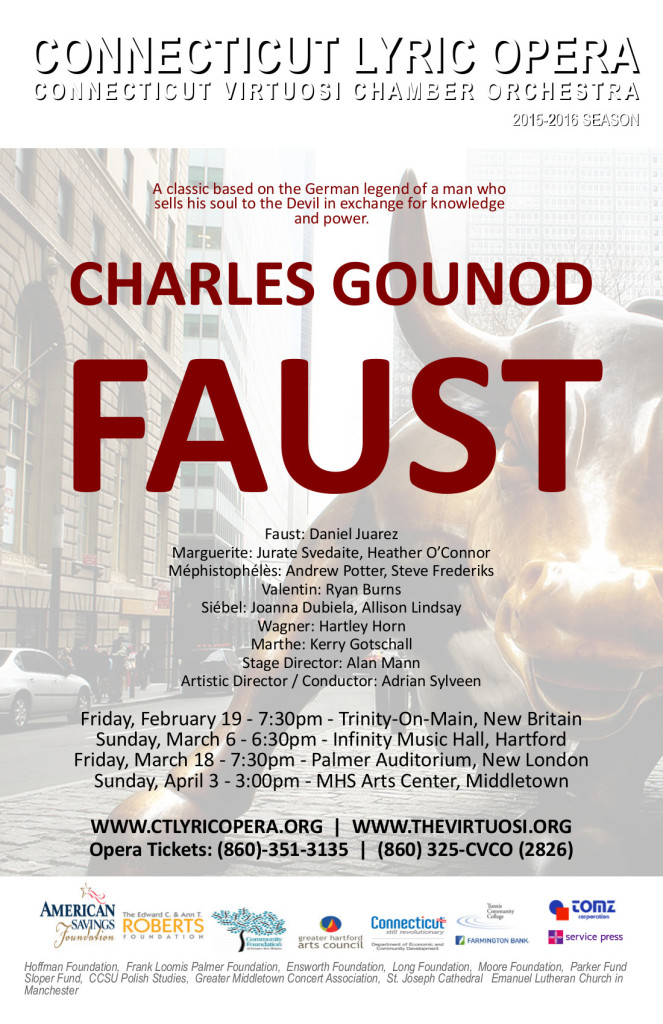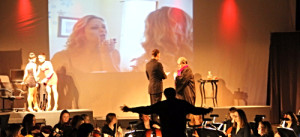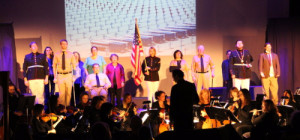By Ethan Sadoian
 Bookended by last fall’s production of Mozart’s “Le Nozze di Figaro” and an upcoming production of Verdi’s “Rigoletto” in April and May, the Connecticut Lyric Opera and Virtuosi Chamber Orchestra continue their 2015-2016 season by teaming up once again to stage a production of Charles Gounod’s grand opera masterpiece “Faust.”
Bookended by last fall’s production of Mozart’s “Le Nozze di Figaro” and an upcoming production of Verdi’s “Rigoletto” in April and May, the Connecticut Lyric Opera and Virtuosi Chamber Orchestra continue their 2015-2016 season by teaming up once again to stage a production of Charles Gounod’s grand opera masterpiece “Faust.”
Gounod’s opera, an 1859 adaption of a portion of the play by Johann Wolfgang von Goethe, originally was not a success in its first production. However, in the subsequent 150+ years, it has established itself as one of the most frequently-performed operas in the repertoire. This production by the CLO is not quite traditional, however. The music remains the same; the libretto is sung in the original French, with projected English supertitles. But the setting and characters are transported from the original 16thcentury Germany to present day Wall Street, with the character of Faust now a highly successful executive at a financial firm instead of an aging scholar.
“The hook for me came with … the aria ‘Le veau d’or’” says stage director Alan Mann. “It’s all about people bowing to money, to the Golden Bull. I suddenly realized that the Golden Bull we all worship now represents the bull markets down on Wall Street. I used that as the starting point, and I thought through how that would all work if moved up to the present time. And there really isn’t a lot in ‘Faust’ that makes it difficult to do that.” Mann goes on to list the themes of the Faustian Bargain, love, Faust’s theft of his love interest Marguerite’s innocence and his subsequent remorse, different types of lust exhibited by all of the main characters, and finally a hope for redemption for the unfortunate, deceived character of Marguerite, as themes that are just as relevant today as they were in Gounod’s and Goethe’s time. “That’s part of what makes it timeless, it’s all about themes that we still understand today.”
Mann, whose background in stage direction spans from Shakespeare to Broadway to opera to his current position as Artistic Director of the Opera Theater of Connecticut, is marking his first collaboration with the CLO. “It’s a very small opera world in Connecticut! The fact that [CLO Artistic Director Adrian Sylveen] is the director of a company and that he’s a conductor, and that I’m the director of a company and I’m a staging director, made it easier to discuss collaboration.”
A more familiar face to the CLO’s audience is tenor Daniel Juarez. Juarez, whose involvement in the CLO goes back over five years to his role as Monostatos in the CLO’s 2010 production of Mozart’s “Die Zauberflöte,” performs in the title role for this production.
 Though Faust is the protagonist, the character is decidedly an antihero, and this poses unique challenges in the way Juarez is able to portray and relate to the character. “Faust’s worldview is certainly different from mine; I’m someone who would never make a deal with the Devil!” he says with a laugh. He continues that Faust’s lack of redemption at the end, in contrast to Marguerite’s salvation, is one thing that makes portraying the character a little easier. And he also remains firmly grounded in his role as an artist: “I think what we do as artists is we highlight some truth about the human condition, and we do it through fiction. So, even though it is an untrue story, there are truths from telling that story, and as artists we point these things out. And I think that themes of justice and right and wrong and those kinds of things are universal. It can be simplistic or it can be complicated; Faust is perhaps a little bit more complicated, and so it’s harder to grasp it.”
Though Faust is the protagonist, the character is decidedly an antihero, and this poses unique challenges in the way Juarez is able to portray and relate to the character. “Faust’s worldview is certainly different from mine; I’m someone who would never make a deal with the Devil!” he says with a laugh. He continues that Faust’s lack of redemption at the end, in contrast to Marguerite’s salvation, is one thing that makes portraying the character a little easier. And he also remains firmly grounded in his role as an artist: “I think what we do as artists is we highlight some truth about the human condition, and we do it through fiction. So, even though it is an untrue story, there are truths from telling that story, and as artists we point these things out. And I think that themes of justice and right and wrong and those kinds of things are universal. It can be simplistic or it can be complicated; Faust is perhaps a little bit more complicated, and so it’s harder to grasp it.”
 Like Mann, he finds a sense of timelessness in the opera’s main themes, accounting for its enduring popularity and for why it is just as relevant to audiences attending the CLO’s upcoming production as it was to Gounod’s audience 150 years ago: “We’re all human beings, we’re all searching for some type of pleasure. We want to avoid pain, none of us wants to get old, none of us wants our life to be without meaning. I think this is why this opera resonates with audiences and why it’s one of the most popular operas in the repertoire, I think it’s because it does illuminate something about the human condition. There is good, there is evil, we all struggle to make the right decisions. Sometimes, and quite too often, human beings are selfish. And sometimes, in our selfishness we fail to accept responsibility for the consequences of our actions,” just as Faust does.
Like Mann, he finds a sense of timelessness in the opera’s main themes, accounting for its enduring popularity and for why it is just as relevant to audiences attending the CLO’s upcoming production as it was to Gounod’s audience 150 years ago: “We’re all human beings, we’re all searching for some type of pleasure. We want to avoid pain, none of us wants to get old, none of us wants our life to be without meaning. I think this is why this opera resonates with audiences and why it’s one of the most popular operas in the repertoire, I think it’s because it does illuminate something about the human condition. There is good, there is evil, we all struggle to make the right decisions. Sometimes, and quite too often, human beings are selfish. And sometimes, in our selfishness we fail to accept responsibility for the consequences of our actions,” just as Faust does.
“But I’ll say this,” he continues: “All that aside, truthfully, this is some of the most beautiful music in the French repertoire, and it’s a real privilege to be able to sing it. As is often the case, some of the baddest characters in opera get the most beautiful music!”
The Connecticut Lyric Opera and Virtuosi Chamber Orchestra perform Charles Gounod’s opera “Faust” on Sunday, March 6th at 6:30 PM, at Infinity Music Hall in Hartford; on Friday, March 18th at 7:30 PM, at Palmer Auditorium of Connecticut College in New London; and on Sunday, April 3rd at3:00 PM, at MHS Arts Center in Middletown. Tickets are available for all performances. For more information, or to buy tickets, visit www.thevirtuosi.org www.